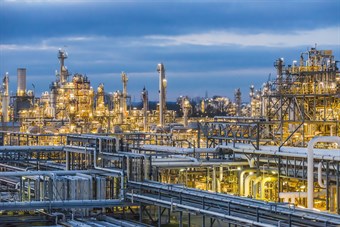Dow takes minority stake in consortium constructing LNG import terminal in Germany
Dow Inc. announced it has signed a definitive agreement to take a minority stake in the Hanseatic Energy Hub GmbH (HEH) and is working with HEH's members to advance Germany's capabilities to import supplies of LNG, bio-liquified natural gas and synthetic natural gas through the construction of an import terminal.

The HEH consortium, which now includes Dow, Fluxys, Partners Group and Buss Group, is planning to build, own, and operate an import terminal for liquified gases on Dow's Stade, Germany industrial park. This zero-carbon emission terminal is to be built by 2026 and will be co-located with Dow's facilities in Stade. Dow is contributing the land for the construction of the terminal as well as infrastructure services, off-gas heat, site services and mutual harbor use rights.
With a projected regasification capacity of 13.3 Bm3y of natural gas, the import terminal supports the Joint Statement between the European Commission and the U.S. on European Energy Security by satisfying up to 15% of Germany's current natural gas demand. The agreement would also allow the U.S. to meet nearly 25% of its goal to export 50 Bm3y of natural gas to Europe by 2030. Additionally, the terminal will repurpose off-gas heat at the Dow site for the carbon emissions-free regasification of the liquefied gas back to its gaseous state.
"This collaboration to construct an LNG import terminal in Germany takes a major step in enabling a stable, cost-effective and sustainable supply of energy to Europe," said Neil Carr president of Dow Europe, Middle East, Africa and India. "For Dow, this allows us to make a significant contribution to transforming the energy supply in Germany in support of its 2045 climate targets while increasing the competitiveness of Stade, a site important for serving Dow customers throughout Europe."
While Germany is retiring nuclear and coal fired power generation, its dependency on natural gas is expected to increase as a transition fuel until sufficient renewable energy comes available longer term. Today, Germany receives approximately half of its natural gas through pipeline imports from Russia and the country has no LNG regasification and import facilities.
The project is subject to FID, which is expected by 2023.

- RWE strengthens partnerships with ADNOC and Masdar to enhance energy security in Germany and Europe
- TotalEnergies and Mozambique announce the full restart of the $20-B Mozambique LNG project
- Venture Global wins LNG arbitration case brought by Spain's Repsol
- KBR awarded FEED for Coastal Bend LNG project
- Norway pipeline gas export down 2.3% in 2025, seen steady this year



Comments